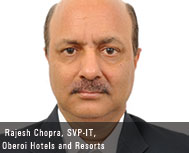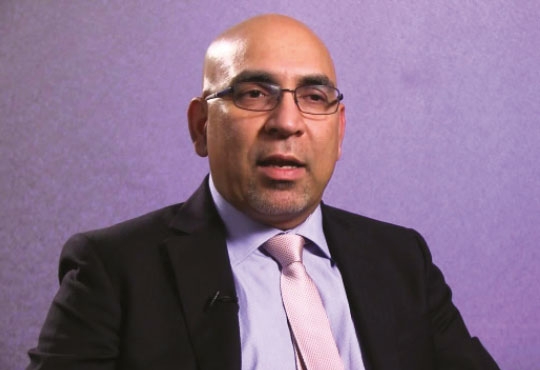
CIOTechOutlook >> Magazine >> August - 2016 issue
Waves of Technological Transformation Causing Ripples of Change in Hospitality Industry
By
 Headquartered in Delhi, The Oberoi Group operates 28 hotels and three cruisers in five countries under the luxury ‘Oberoi’ and five-star ‘Trident’ brands.
Headquartered in Delhi, The Oberoi Group operates 28 hotels and three cruisers in five countries under the luxury ‘Oberoi’ and five-star ‘Trident’ brands. Q: The importance of technology in hospitality business is rapidly evolving. Hoteliers are no more looking at technology adoption as a choice but a necessity. How do you view the changing landscape of the Hospitality industry?
Technology has become critical to attracting and retaining hotel guests, and today that means investing in a wide range of solutions that create immediate and personal engagement. With rising expectations, surprise and delight has been replaced by expected and assumed. Reservations must be easily made via any smart device, guestrooms must facilitate any type of content, networks need to be rock-solid, and data is now your most valuable asset.
Q: As a hotelier in today’s highly competitive market, one can’t afford to put money on hotel software that is not robust enough to automate operations with maximum ease. It is always prudent to opt for integrated Hotel Software that would efficiently assist in handling multiple operations across departments. What are your thoughts on this?
Availability of right information at right time with right stakeholder has become eminent need for the hotel chains. Decentralized IT systems have given way to integrated hotel management systems and ERP Systems of the day. Integrated IT landscape helps hotel chains on looking at "one instance of truth" accessed by all decision makers which helps in removing ambiguity and confusion in information access.
Q: Modern hotel guests have high expectations and they require hotels to deliver a personalized service which fulfills their core needs and wants. That’s why industry insiders name it as “Personalized model” of guest service. Shed some light on this trend that is flourishing through the domain.
Hotels have long amassed data but underused it. Data is the most valuable asset for many brands, and tapping into it will be a priority to deliver the personalization that travelers want. If guests don’t find what they want from you and you aren’t leveraging your data in the right way to serve them, they will move onto a competitor. Mobile technology is exponentially increasing those data inputs. Nearly 80 Percent of all data today already has a location-based element. Location has become the new ‘cookie’. According to a recent research, 30 percent of hotels plan to roll out location-based technology in 2016. Using mobile data together with reservation information from the PMS has helped hotels to upsell guests through pre-arrival and checkout offers, enabling the resort to optimize room revenue by inviting guests to arrive early or stay late for an additional fee. Balancing early check-ins against actual arrival times also helps hotels better manage room availability.
Q: What do you think are the Security concerns that the domain faces today and how can one overcome them?
Security is garnering investment particularly as payment becomes increasingly mobile and new non-bank payment vehicles emerge. Providing for more secure payments and data is the top objective driving technology investments for the hotels. It’ll receive about 12 percent of overall IT budgets this year, which is a 25 percent budget increase over the year prior. Guest privacy in general is a growing challenge with the addition of mobile and social channels, and the increasing sophistication of data piracy is drawing increased investment in intrusion detection and prevention.
Q: Where do you envision the Indian Travel and Hospitality domain in the next 10 years? What changes do you think can the present government initiatives can bring forth in this domain?
Internet of Things (IOT)- IoT will expand to enhance both guest experience and operations efficiency in everything from deploying staff where guests are congregating to preventing
equipment breakdowns.
Wireless charging- Charging is going wireless with devices such as Kube Systems chargers using the Qi standard in hotel lobbies. The next generation is longer-range wireless charging such as TechNovator’s XE, which uses resonant electromagnetic fields to charge multiple phones with special cases up to 17 feet away.
Virtual reality- Last Fallan International hotel piloted a virtual reality headsets program at two properties that enabled guests to take virtual trips to exotic locations. It is envisioned using VR glasses and apps to enable prospective guests to tour conference spaces and guest rooms.
Robotics- Relay robotic concierge from) was named first runner-up “Most Innovative Hospitality Technology” at HTNG’s 2016 TechOvation Awards. In a similar move, another international chain has teamed with a technology giant to pilot its robot concierge, which uses cognitive technology to process information as it interacts with guests, enabling it to adapt and improve recommendations as it learns.
Interactive walls- Gesture-controlled, interactive walls received 36 Percent of respondents’ votes for futuristic technology most likely to take hold. Using a variety of technology including motion detectors, projectors and 3D cameras, the a “living” wall can interact with guests and respond to their movement.
CXO Insights
Accolite: Redefining Corporate Governance to...
By CIOReview Team
Leveraging Big Data for Efficient Fleet Management
By Dr Anand Medepalli, EVP, Chief Product Officer & Head - Data Science, RateGain
From Regulatory Mandate to Enterprise...





